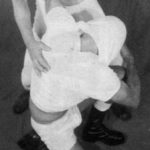The myth of Aufheben: A comment on Matthieu Renault’s Hegelian myth of counter-violence
Matthieu Renault argues in a recent issue of Radical Philosophy (RP 2.10, Summer 2021) that justifications for the counter-violence of the oppressed which draw on Hegel’s master-slave relation are based on a myth originating from Kojève’s Paris lectures (1933-9). The Kojève myth is that history begins with the violence of the master over the slave […]




